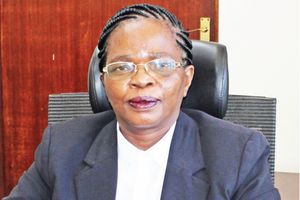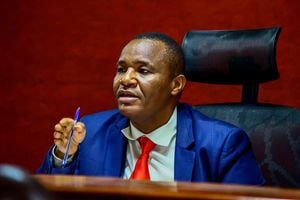
Chief Justice Martha Koome.
Surveys and complaints by lawyers and members of the public places the Judiciary as a weak link in the administration of justice.
In a paper presented by Law Society of Kenya (LSK) President Faith Odhiambo during an engagement with Chief Justice Martha Koome, lawyers also pointed out that allegations of corruption coupled with inconsistent development of jurisprudence have made it difficult for the Judiciary to defend and re-evaluate itself.
Ms Odhiambo added that there were cases of misconduct against judicial officers but the most glaring form of judicial misconduct “has to be corruption”.
“Instead of justice and truth being weighed against evidence, it is traded and auctioned to the highest bidder in total disregard to the rule of law and constitutional and legal principles,” Ms Odhiambo said in her presentation.
Chief Justice Koome invited LSK, representatives of senior bar counsel and heads of courts as well as Judicial Service Commission members, for an engagement over complaints of corruption in the Judiciary.
In the paper, Ms Odhiambo pointed out that public confidence in the judicial system has significantly dwindled to an extent that even advocates, in occasions where they have clear-cut cases still seem helpless before their clients.
Ms Odhiambo said there were credible allegations of the return to systemic and institutionalised corruption within the Judiciary with the effect of undermining judicial independence and public confidence and trust.
She added that there were complaints pointing to “unfettered bribery and unethical conduct” by judicial officers, which weakens and undermines the justice system while eroding the credibility and effectiveness of the Judiciary.
When the complaints were made public, Ms Odhiambo noted that the Judiciary reacted with a “knee-jerk reaction” by transferring the concerned judicial officer to a new court station.
Ms Odhiambo said the transfer appears to be intended to deflect attention from the substantive issues and concerns emerging.
She added that while a transfer is not a demotion or an effective administrative action to address malpractice and malfeasance, the move achieves the undesirable outcome of undermining public confidence in the judiciary, particularly at a time when serious concerns exist over the general administration of the Judiciary.
“Such an action directly indicates an uncanny unwillingness to treat complaints raised against judges with the requisite seriousness, even in the face of subsisting questions on their competence, integrity and standing,” she said.
She said the LSK has also noted with concern that there is an inexcusable upsurge in suspended court proceedings on account of judges and magistrates attending to miscellaneous activities and functions.
“The disconcerting prevalence of this phenomenon is not only inconvenient and costly, but also poses a significant threat of derailing the effective performance of judicial functions in accordance with Article 159 of the Constitution, and breach of the right to access to Justice under Article 48,” she said.
Ms Odhiambo said the concerns founded or not must be addressed with utmost urgency, objectivity and seriousness in a manner that restores confidence in the Judiciary.
Other matters addressed by LSK were general dissatisfaction with the Judiciary’s level of service delivery, which is compounded by the long turnaround time of matters in the courts and unsatisfactorily reasoned determinations even after the delays.
She pointed out, for instance, the recent decisions with respect to the constitutionality of the Finance Act 2023 and the Independent Electoral and Boundaries (IEBC) Amendment Act, which were both delivered two years after they were brought before the courts.
She said the net effect of such delays is that the decisions were delivered too late in the day to address the mischief for which the legal challenges were lodged, “creating otherwise avoidable room for uncertainty on important legal questions and matters of national importance.”
“The Judiciary must, in the circumstances, affirmatively reclaim its place as a stalwart for constitutionalism and proactively take its rightful place as an independent institution and third arm of government operating at per with the Executive and Legislature, not playing second fiddle as a post-facto, second-hand player in governance,” she added.
Ms Odhiambo also touched on the issue of recurrent E-filing challenges that range from electricity fluctuations to system downtime.
“The society appreciates the Judiciary’s efforts to roll out e-filing throughout the country, however, more needs to be done to ensure the efficiency of the system,” she said.
“The Judiciary has made tremendous effort post-2010 Constitution in the realisation of its role as the custodian of the rule of law. However, these efforts have been mauled by inconsistencies in jurisprudence, institutionalized corruption and the lack of a strong self-regulation mechanism. Unless these issues are addressed to finality, the judiciary continues to lose public confidence and relevance and the same is a precursor of anarchy,” Ms Odhiambo said.
While calling for the meeting, Justice Koome said the agenda of the meeting will include the development of a comprehensive and actionable roadmap to ensure that complaints from members of the legal profession and the public touching on corruption and misconduct of judges, judicial officers, and staff contain details and particulars necessary for immediate action by the JSC.
The team will also get an update on the progress of complaints currently before the JSC and an update on the mechanisms adopted by the Judiciary to address corruption and enhance transparency and accountability.











